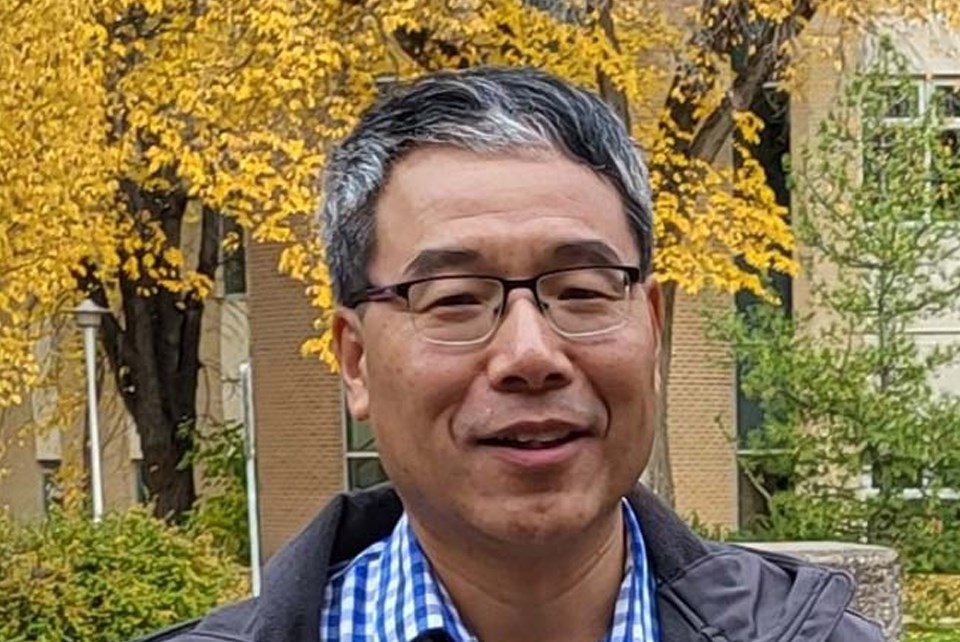SASKATOON — Dr. FangXiang Wu (PhD), a world-renowned pioneer in computational intelligence for medical/biological data analytics and widely recognized for his seminar contributions to biomarker discovery, medical image analysis and health informatics, is the University of Saskatchewan’s (USask) Distinguished Researcher for fall 2024.
“It’s amazing and exciting to be awarded this top honour,” said Wu, who is a professor in USask’s College of Engineering Department of Mechanical Engineering and Division of Biomedical Engineering, and also the College of Arts and Science’s Department of Computer Science.
Wu’s expertise in computational intelligence refers to training computer systems to develop human-like intelligence, mimicking such things as perception, reasoning and adaptation. It involves using algorithms to capture hidden knowledge from data to help humans make complex decisions.
“Dr. Wu’s research is producing tangible results for the health industry and is furthering scientific progress worldwide,” wrote Dr. Carey Simonson (PhD), former interim Dean of Engineering, and Dr. Scott Noble (PhD), Department Head of Mechanical Engineering, who nominated Wu for the recognition.
Wu earned his PhD in computational biology in August 2004 from USask and subsequently completed a post-doctoral fellowship at Université Laval. He returned to USask’s College of Engineering as an assistant professor in August 2005 and became a full professor in July 2012.
Computational biology — also known as bioinformatics — was a new field when Wu was pursuing a USask doctorate in the early 2000s. It required skills in mathematics and biology—a nice fit for Wu, who had bachelor’s and master’s degrees in applied mathematics from the Dalian University of Technology, and a PhD in control theory from Northwestern Polytechnical University in China (1998).
Wu describes his research in this way: “It is designing artificial intelligence algorithms to analyze the biological or biomedical data to find knowledge for understanding, diagnosis, treatment and prognosis of complex diseases such as Alzheimer’s, Parkinson’s, autism, and cancer.”
His group’s world-leading findings have been published in top research journals, including more than 360 refereed papers. He has presented more than 130 papers at refereed conferences, and given more than 100 invited lectures at international conferences and institutions. The nearly 16,000 citations by other researchers of Wu’s papers attests to his global impact, as does his appearance every year since 2017 on Stanford University’s list of World’s Top Two Percent of Scientists.
Wu said his group also created numerous free downloadable software packages for knowledge translation. Some of their software systems have been widely used by health scientists and practitioners to identify important elements such as essential proteins, biomarkers, drug targets, and functional modules from some bionetworks, while others had been used for improving the diagnosis and treatment of complex diseases such as liver cancer and Parkinson’s.
Wu has secured close to $2 million in competitive external research grants, including strategic grants and discovery grants from the Natural Sciences and Engineering Research Council of Canada (NSERC), and the Canada Foundation for Innovation (CFI). He has trained more than 60 highly qualified personnel (HQP), six of whom hold faculty positions in Canada and 10 others outside Canada. Many more work in health-related or high-tech industries, demonstrating his exceptional contributions to academia and industry.
Currently, Wu serves as an associate editor or editorial board member of several journals and is a lead guest editor of more than 20 journal issues. He has also chaired more than 10 international conferences.
“In addition to his national and international collaborations, (Dr. Wu) has established numerous and broad collaborations at University of Saskatchewan, which greatly contribute to our campus research communities,” noted Simonson and Noble.
— Submitted by USask Media Relations




